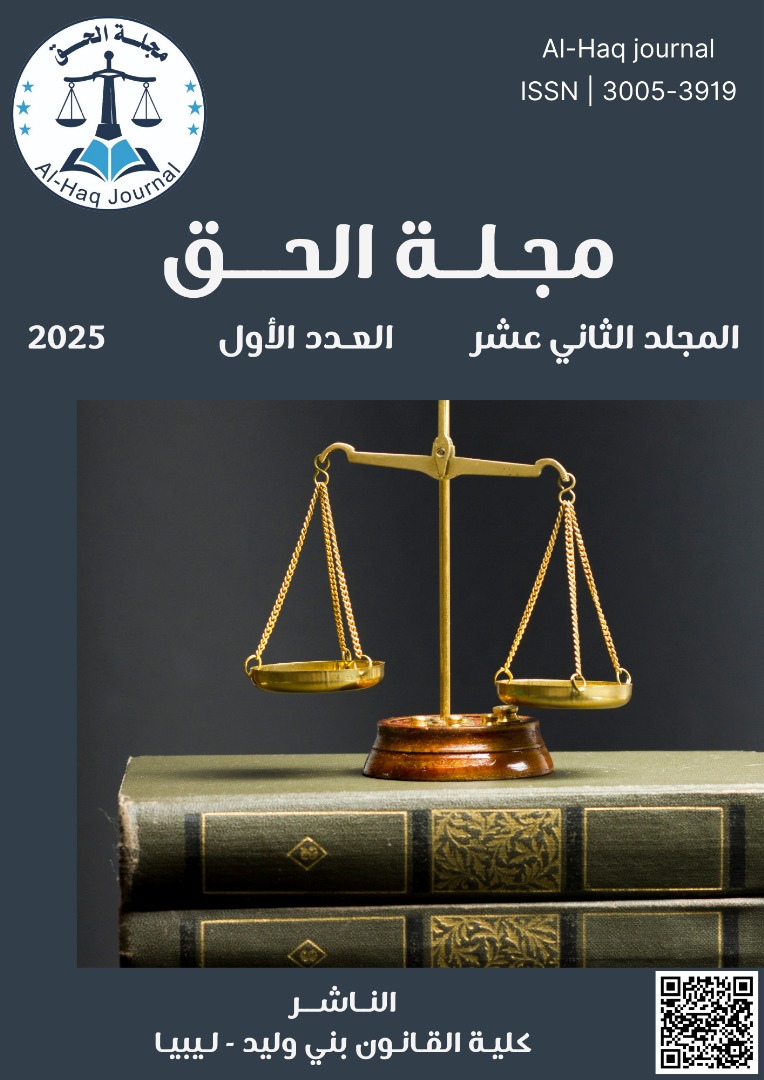Factors affecting compliance with international humanitarian law
DOI:
https://doi.org/10.58916/alhaq.v12i1.344الكلمات المفتاحية:
Political will، public opinion، accountability، training، capacityالملخص
International humanitarian law (IHL) is one of the most important branches of public international law, aiming to protect persons not involved in armed conflicts and to mitigate the effects of war on civilians. This law stems from the fundamental principles of humanity, seeking to ensure respect for human dignity even in the most dire circumstances. The rules of IHL have evolved throughout history as a result of war experiences and international efforts to alleviate the suffering they cause. The Geneva Conventions and their Additional Protocols, along with numerous other international treaties, are the cornerstone of IHL. IHL is characterized by its well-established principles, including the distinction between combatants and civilians and the prohibition of the use of weapons and methods that cause unnecessary suffering. It also plays a significant role in regulating the conduct of warring parties, imposing legal obligations on states and armed groups to ensure compliance with humanitarian standards. Furthermore, international organizations, such as the International Committee of the Red Cross (ICRC), monitor the implementation of IHL and provide support to victims.
التنزيلات
المراجع
أبو الوفا، أ. (2006). النظرية العامة للقانون الدولي الإنساني. دار النهضة العربية.
إبراهيم، ن. أ. (2009). المسؤولية الدولية عن الانتهاكات في قواعد القانون الدولي الإنساني. منشأة المعارف.
اشويطر، م. ع. ا. بحث قانوني بعنوان الأسس الأولية للقانون الإنساني الدولي. جامعة عين شمس، كلية الحقوق، قسم القانون العام.
البعاج، ز. م. م. (2020). النزاع المسلح المدول في ضوء قواعد القانون الدولي الإنساني (رسالة دكتوراه). جامعة كربلاء، العراق.
الزمالي، ع. (2007). مقالات في القانون الإنساني والإسلام (ط. 2). الإسكندرية.
سلطان، ح. (1969). الحرب في نطاق القانون الدولي. المجلة المصرية للقانون الدولي، 25.
سيد هاشم. (1982). القانون الإنساني والقوات المسلحة. في أعمال الندوة المصرية الأولى حول القانون الدولي الإنساني. الجمعية المصرية للقانون الدولي.
شهاب، م. (2000). دراسات في القانون الدولي الإنساني (ط. 1). دار المستقبل العربي.
شريف عتلم، د.، وماهر، م. (2008). موسوعة القانون الدولي الإنساني (ج. 8). اللجنة الدولية للصليب الأحمر.
عتلم، ش. (2005). محاضرات في القانون الدولي الإنساني (ط. 5). اللجنة الدولية للصليب الأحمر.
الغنيمي، ط. (1982). نظرة عامة في القانون الإنساني الدولي الإسلامي. في أعمال الندوة المصرية الأولى حول القانون الدولي الإنساني. الجمعية المصرية للقانون الدولي.
فؤاد، م. أ. فكرة الضرورة في القانون الدولي العام. منشأة المعارف.
جويلى، س. س. (2005). المدخل لدراسة القانون الدولي الإنساني. دار النهضة العربية.
معروف، م. خ. م. (2016). دور القانون الدولي الإنساني في حماية المدنيين أثناء النزاعات المسلحة: انتهاكات إسرائيل ضد قطاع غزه سنه 2014 نموذج (رسالة ماجستير). جامعة الأقصى.
مريبوط، ز. (1988). مدخل إلى القانون الدولي الإنساني. جنيف.
المخزومي، ع. م. (2008). القانون الدولي الإنساني في ضوء المحكمة الجنائية الدولية (ط. 1). دار الثقافة.
ميليزر، ن. (2016). مقدمة شاملة القانون الدولي الإنساني. اللجنة الدولية للصليب الأحمر.
يونس، م. م. (1989). ملامح التطور في القانون الدولي الإنساني (ط. 1). دار النهضة العربية.













